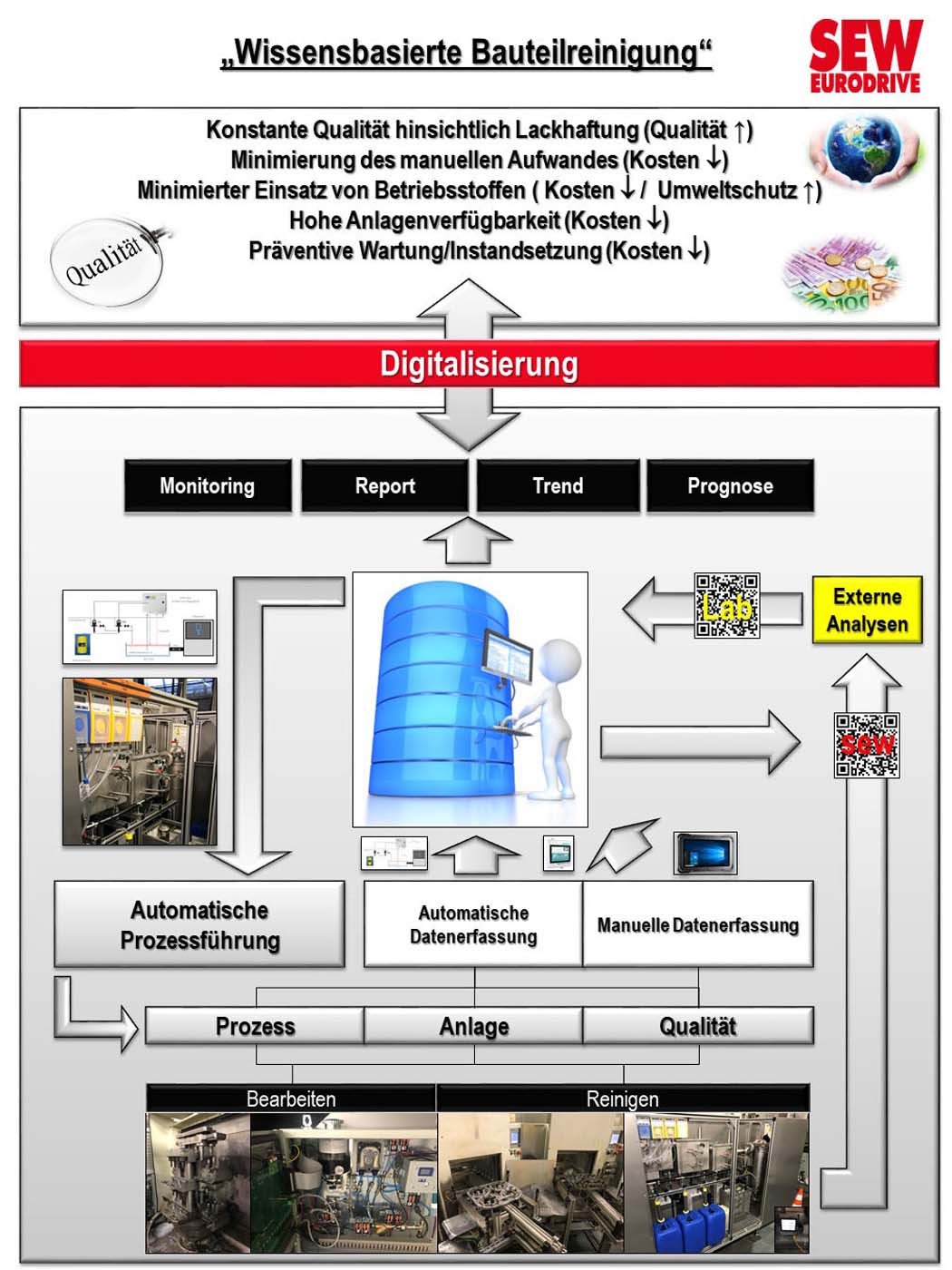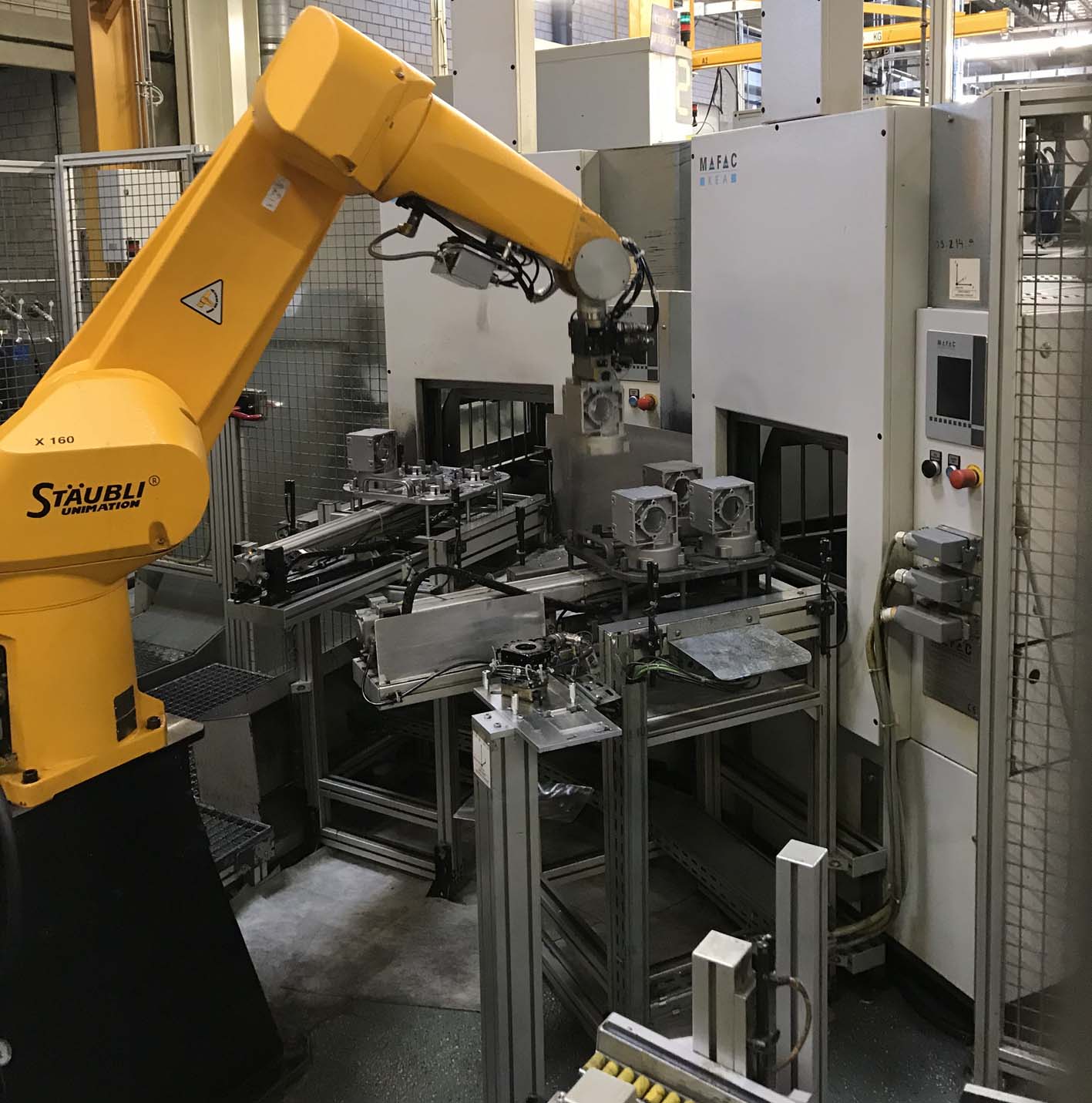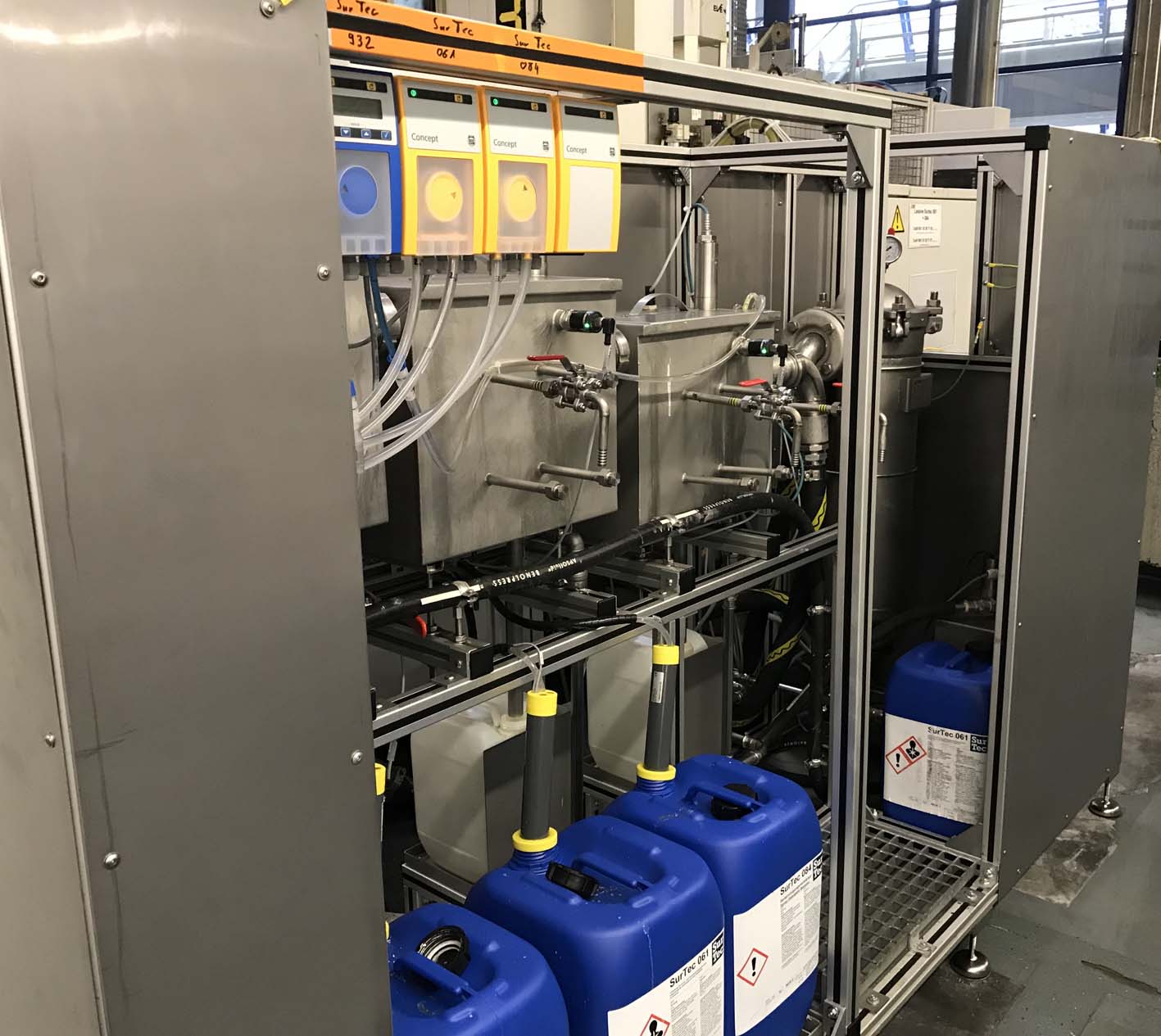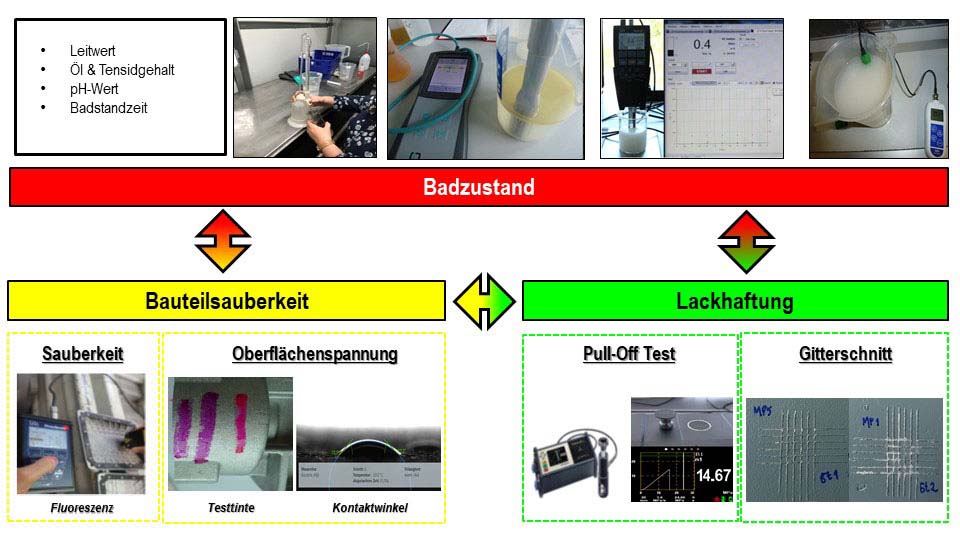MAFAC and SEW Eurodrive on their way to parts cleaning 4.0
The concepts for Industry 4.0. are taking shape. The German Professional Association for Industrial Parts Cleaning (FiT) also addresses the subject and initiated the “QSRein 4.0” research programme in 2017. Under this umbrella, various development projects are to search for approaches for the digitisation of cleaning processes. At the end of April, SEW Eurodrive and MAFAC launched a pilot plant meant to provide comparable data for the quality of cleaning baths.
Everyone is talking about Industry 4.0. But what exactly does digitisation mean for the cleaning industry? Are machine technology as well as cleaning chemistry and processes ready for facilitating the networking of processes? A survey among experts conducted by the association in 2017 showed that there is still considerable need for action in the field of component cleaning in order to enable digitisation.
QSRein 4.0
With the QSRein 4.0 research project, the Professional Association for Industrial Parts Cleaning wants to create the necessary conditions and provide application-oriented and useful 4.0 solutions. In a first step, the mission is to raise the still relatively young discipline of cleaning technology to a new level. That means developing it from previously experience-based to knowledge-based process management, thus creating points of contact for communication with manufacturing peripherals and digital networking.
Data collection and networking
A look at the current situation of aqueous parts cleaning shows that neither plant technology nor chemistry nor processes can independently identify when the cleaning effect of the baths is diminishing and no automated response is possible, either. Plant operators are still bound to observe and change cleaning baths manually. Currently, this is done based on experience but not on the basis of comparable key figures or technical signals. Therefore, bath changes and machine downtimes do not represent process variables that can be planned. One condition for cleaning 4.0 are verified data via a self-monitoring network announcing the bath change centrally so that machine availability can be planned and the upstream and downstream processes can respond accordingly. Thinking another few steps ahead, the machine would independently initiate a bath change and thus keep the cleaning effect and the quality of the parts consistently stable. The entire manufacturing chain, from material flow to upstream and downstream processes, would also react as a network. “For this to become possible in future, we still need a multitude of observations and evaluations of processes and machines. We are looking for points of intersection and evaluable data in order to realise the communication of relevant information”, says Thomas Gutmann, Head of Customer Support at MAFAC.
Joint development work by SEW Eurodrive and MAFAC
Together with SEW Eurodrive, the leading manufacturer for drive technology, MAFAC developed a pilot plant, that has been in operation at SEW’s Forbach site in France since April 2019 and has provided first insights for digitisation. With it, the two are pursuing another project within SEW’s 4.0 activities: The project with MAFAC aims at increasing machine availability, keeping the process stable, ensuring cleaning quality, and gathering as many parameters as possible to derive initial standards for networking.
Pilot project smart@cleaning
The pilot plant comprises two spray cleaning machines type MAFAC KEA with single-bath technology, which are coupled to a robot and a production plant for gear housings. The aluminium components produced in three-shift operation undergo a two-stage cleaning process in which they are prepared for coating. “As the surface preparation of aluminium components for coating with hydro varnishes is a very sensitive matter and the adhesive quality is hard to maintain, we used this process as a model”, explains Roland Denefleh, Head of Technology Development Surface Coatings at SED Eurodrive. “The coating system and the cleaning chemistry have to be compatible. The correct composition, exact dosage and stable quality of the cleaning baths are decisive factors". How these are specified in individual cases is currently determined by means of numerous tests and on the basis of empirical values. “As soon as something about the coating system changes, we have to start testing again what cleaner in what dosage ensures the adhesive quality of the coating. This is a time-intensive and inefficient process”, says Franziska Link, project manager and expert for component pre-treatment at SEW Eurodrive. The entire cleaning process is affected by many variables, some of which are still unknown, difficult to grasp and unreliable. All in all, the current situation offers a rich pool for Industry 4.0-oriented research.
With the pilot plant, it is now possible to compare different analysis methods with identical bath parameters and to investigate the mutual relationship between paint adhesion and cleaning quality. In addition, it allows maximum automatic control of the machine. The system is equipped with a specially designed maintenance module for the collection of data, which provides a detailed analysis of the bath condition. It has a triple cascaded oil separator with several sampling points and an upstream filter with measuring technology for digital monitoring of the builder concentration and conductance monitoring. Digital monitoring of the filter condition as well as the possibility of consumption-oriented dosing of the cleaning components by means of a dosing device is also provided. The use of a fully automatic partial quantity discharge in favour of longer useful bath lives has been prepared. The maintenance module is coupled to the two chambers of the MAFAC KEA machines (cleaning, rinsing), and the available process, plant and quality parameters are made available for further processing. For this purpose, the MAVIATIC control of the machines was made network-compatible, so that the data is transmitted to the central network of SEW via Ethernet and stored for evaluation.
Basic groundwork and initial findings
The first research phase will now be about reviewing the large number of very different analysis methods both for monitoring the bath quality and the surface cleanliness with regard to their reliability. It is important to note that some analysis results are available within a few minutes and can be recorded in production. For other analyses, however, a laboratory is required, which is why the results are only available after several days. "Before this data is unambiguously available, automated digitisation is still very limited," says Thomas Gutmann. As a preliminary stage, the pilot plant allows so-called manual digitisation, which ensures a clear allocation of the analysis results at the time of production. This is done by means of a QR code, with the respective information being recorded by the specially developed operating software of the control module. This in turn enables real-time monitoring, limit value monitoring, trend analyses and messages on process and plant technology for purposes of predictive maintenance. Manual digitisation also serves to check the informative value of the measurements. “As soon as we have gathered enough reliable data this way and also know whether the measuring equipment used measures the right parameters, we can think about the next step towards 4.0”, says Roland Denefleh. "With the collected data, we will try to find the parameters that characterise an "unambiguous" correlation between bath quality and component cleanliness. Of course, an attempt is also made to find the "correct" causalities. For this purpose, more data will certainly be necessary, as will the involvement of the coatings industry. The insight gained is the basis for future requirements for cleaning systems and for the general digitisation of all cleaning processes at SEW Eurodrive.

As part of FiT’s QSRein 4.0 research project, MAFAC and SEW Eurodrive are investigating the cleaning process of aluminium components for a subsequent coating process. Aim of the project: increasing machine availability, keeping the process stable, ensuring cleaning quality, as well as gathering as many parameters as possible and gaining initial standards for networking.

The pilot plant comprises two spray cleaning machines type MAFAC KEA with single-bath technology, which are coupled to a robot and a production plant for gear housings.

The system is equipped with a specially designed maintenance module for the collection of data, which provides a detailed analysis of the bath condition. For this purpose, it is equipped with several sampling points and various measuring technologies for digital monitoring of the builder concentration and conductance monitoring. In addition, the filter condition is monitored digitally.

Various analyses provide an indication of the correlation between bath quality and cleanliness.
back to last page
back to overview


